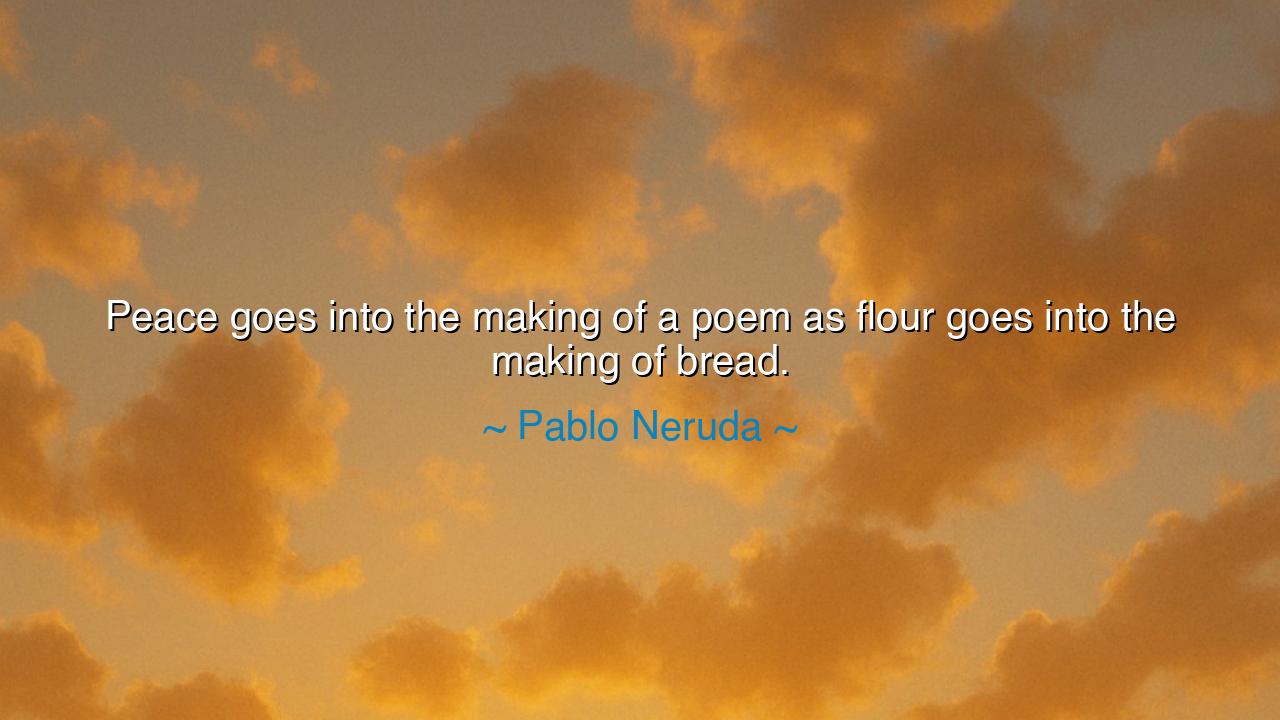
Peace goes into the making of a poem as flour goes into the






Pablo Neruda, poet of Chile and voice of the human soul, once uttered with the intimacy of a craftsman: “Peace goes into the making of a poem as flour goes into the making of bread.” These words, though wrapped in simplicity, speak of the deepest mysteries of art, life, and spirit. For just as bread cannot exist without flour — its foundation, its essence, its substance — so too a poem cannot truly breathe without peace. A poem without peace is but noise; a poem with peace becomes nourishment for the soul, as bread is for the body.
The ancients would have understood this kinship between sustenance and song. In Greece, the muses inspired poetry, but offerings of grain and bread were laid upon their altars. Poetry and bread, wisdom and sustenance, were inseparable. To create a hymn, the poet needed inner stillness, a harmony of mind that allowed the music of truth to flow. Likewise, the baker needed patience, quiet, and care to bring forth bread from simple flour. Neruda reminds us that peace is not an ornament to creation, but its very foundation — as essential to the poet’s pen as flour to the baker’s hand.
History shows us this truth. Consider the great flowering of literature in Florence during the Renaissance. After centuries of war and darkness, a measure of stability and peace allowed artists and poets like Petrarch, Dante’s successors, and later Michelangelo to create works that endure across centuries. Their poems were not born in the clamor of swords, but in the quiet where the mind could breathe, where peace gave them room to shape words as carefully as the baker shapes dough. Without that peace, the treasures of their art would never have been baked into being.
By contrast, when peace is absent, poetry falters. In times of ceaseless war and oppression, words often collapse into propaganda or shrieks of rage. They may burn with fire, but they do not nourish as bread nourishes. During the horrors of the Thirty Years’ War, Europe’s fields were wasted, and so too was much of its literature. Poets were silenced or drowned in chaos. Neruda’s words echo here: without peace, the flour is missing, and the bread cannot rise.
Children of tomorrow, understand this: peace is not only the end of war, but the stillness of the heart, the harmony of the spirit, the balance of life. If you wish to create — to write, to paint, to build, to dream — you must first cultivate inner peace. For what you create reflects the state of your soul. A troubled heart can cry out, but a peaceful heart can sing in a way that feeds others. Bread fills the stomach; poetry filled with peace fills the soul.
The lesson is clear: cultivate peace within and around you, for from it flows creativity, beauty, and strength. Do not despise the quiet moments, for they are your flour. Do not rush past stillness, for it is the yeast of creation. When you seek to build or to write, first ground yourself in peace, so that your work may rise, light and nourishing, to feed the world.
Practical action flows from this truth. Begin by seeking silence each day, a place where your heart may rest from the noise of the world. Tend to peace in your relationships, for conflict and bitterness starve the spirit. Feed on wisdom, on kindness, on simplicity, and let them become the flour from which your own life-poem is baked. And when you create, whether in words, in work, or in love, let peace be your foundation.
So let it be remembered: “Peace goes into the making of a poem as flour goes into the making of bread.” Neruda’s words are not only for poets, but for all who would live meaningfully. Peace is the ingredient of life itself — without it, we starve; with it, we are nourished. Guard it, cherish it, and let it rise within you, so that what you give to the world may be as sustaining as bread to the hungry.






AAdministratorAdministrator
Welcome, honored guests. Please leave a comment, we will respond soon